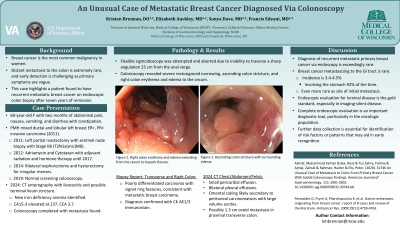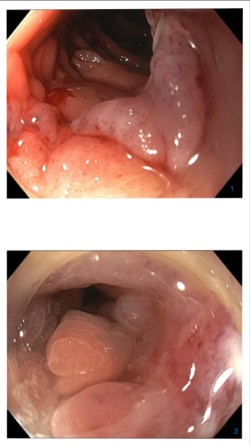Sunday Poster Session
Category: Colon
P0264 - An Unusual Case of Metastatic Breast Cancer Diagnosed via Colonoscopy
Sunday, October 27, 2024
3:30 PM - 7:00 PM ET
Location: Exhibit Hall E

Has Audio

Kristen Brennan, DO
Medical College of Wisconsin
Milwaukee, WI
Presenting Author(s)
Kristen Brennan, DO, Elizabeth Auckley, MD, Sonya Dave, MD, Francis Edeani, MD
Medical College of Wisconsin, Milwaukee, WI
Introduction: Worldwide, breast cancer plagues more women than any other malignancy. Distant metastasis to the colon is extremely rare, and early detection is challenging as primary symptoms are vague. This case highlights a patient found to have recurrent metastatic breast cancer on endoscopic colon biopsy after seven years of remission.
Case Description/Methods: A 60-year-old female was diagnosed with mixed ductal and lobular left breast ER+, PR+ invasive carcinoma in 2011. She underwent left partial mastectomy with sentinel node biopsy with Stage IIB (T2N1a(mic)M0). She completed chemotherapy with Adriamycin and Cytotaxan in 2012 followed by adjuvant radiation and hormone therapy until 2017. In 2014, she underwent bilateral oophorectomy and hysterectomy for irregular menses. She continued with routine oncologic follow-ups without evidence of recurrence. A 2019 screening colonoscopy was normal, with recommendation for 10-year interval re-screening. In 2024, she was referred to gastroenterology following two months of abdominal pain, nausea, vomiting, and alternating constipation and diarrhea. She felt symptoms began following a bout of food poisoning after eating undercooked meat. Imaging demonstrated ileocecitis and possible terminal ileum stricture. Flexible sigmoidoscopy was attempted and aborted due to inability to traverse a sharp angulation 25 cm from the anal verge. Subsequent colonoscopy was performed with an extended time frame and supportive instrumentation. This revealed severe rectosigmoid narrowing, ascending colon stricture, and right colon erythema and edema to the cecum. Biopsy reports of the transverse and right colon demonstrated poorly differentiated carcinoma with signet ring features, consistent with metastatic breast carcinoma, confirmed with CK AE1/3 immunostain. Further workup demonstrated a pericardial effusion, new iron deficiency anemia, and elevated cancer antigen 15-3.
Discussion: Diagnosis of recurrent metastatic primary breast cancer via abnormal colonic mucosa is not well documented and exceedingly rare. Current literature states the incidence of breast cancer metastasizing to the GI tract is 3.4-4.5%. This case highlights why endoscopic evaluation for luminal disease is the gold standard, especially in imaging silent disease. Complete endoscopic evaluation, with repeated attempts if initially unsuccessful, is an important diagnostic tool particularly in the oncologic population.

Disclosures:
Kristen Brennan, DO, Elizabeth Auckley, MD, Sonya Dave, MD, Francis Edeani, MD. P0264 - An Unusual Case of Metastatic Breast Cancer Diagnosed via Colonoscopy, ACG 2024 Annual Scientific Meeting Abstracts. Philadelphia, PA: American College of Gastroenterology.
Medical College of Wisconsin, Milwaukee, WI
Introduction: Worldwide, breast cancer plagues more women than any other malignancy. Distant metastasis to the colon is extremely rare, and early detection is challenging as primary symptoms are vague. This case highlights a patient found to have recurrent metastatic breast cancer on endoscopic colon biopsy after seven years of remission.
Case Description/Methods: A 60-year-old female was diagnosed with mixed ductal and lobular left breast ER+, PR+ invasive carcinoma in 2011. She underwent left partial mastectomy with sentinel node biopsy with Stage IIB (T2N1a(mic)M0). She completed chemotherapy with Adriamycin and Cytotaxan in 2012 followed by adjuvant radiation and hormone therapy until 2017. In 2014, she underwent bilateral oophorectomy and hysterectomy for irregular menses. She continued with routine oncologic follow-ups without evidence of recurrence. A 2019 screening colonoscopy was normal, with recommendation for 10-year interval re-screening. In 2024, she was referred to gastroenterology following two months of abdominal pain, nausea, vomiting, and alternating constipation and diarrhea. She felt symptoms began following a bout of food poisoning after eating undercooked meat. Imaging demonstrated ileocecitis and possible terminal ileum stricture. Flexible sigmoidoscopy was attempted and aborted due to inability to traverse a sharp angulation 25 cm from the anal verge. Subsequent colonoscopy was performed with an extended time frame and supportive instrumentation. This revealed severe rectosigmoid narrowing, ascending colon stricture, and right colon erythema and edema to the cecum. Biopsy reports of the transverse and right colon demonstrated poorly differentiated carcinoma with signet ring features, consistent with metastatic breast carcinoma, confirmed with CK AE1/3 immunostain. Further workup demonstrated a pericardial effusion, new iron deficiency anemia, and elevated cancer antigen 15-3.
Discussion: Diagnosis of recurrent metastatic primary breast cancer via abnormal colonic mucosa is not well documented and exceedingly rare. Current literature states the incidence of breast cancer metastasizing to the GI tract is 3.4-4.5%. This case highlights why endoscopic evaluation for luminal disease is the gold standard, especially in imaging silent disease. Complete endoscopic evaluation, with repeated attempts if initially unsuccessful, is an important diagnostic tool particularly in the oncologic population.

Figure: Figure 1. Right colon erythema and edema extending from the cecum to hepatic flexure.
Figure 2. Ascending colon stricture with surrounding edema.
Figure 2. Ascending colon stricture with surrounding edema.
Disclosures:
Kristen Brennan indicated no relevant financial relationships.
Elizabeth Auckley indicated no relevant financial relationships.
Sonya Dave indicated no relevant financial relationships.
Francis Edeani indicated no relevant financial relationships.
Kristen Brennan, DO, Elizabeth Auckley, MD, Sonya Dave, MD, Francis Edeani, MD. P0264 - An Unusual Case of Metastatic Breast Cancer Diagnosed via Colonoscopy, ACG 2024 Annual Scientific Meeting Abstracts. Philadelphia, PA: American College of Gastroenterology.
